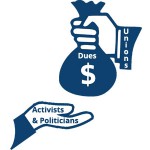The Invisible Line Between Unions and the Far Left
This post reprints a section of the RI Center for Freedom & Prosperity’s new report, “RI Union Political Spending: A Web of Corruption.”
Prominently on the website of the National Education Association of Rhode Island (NEARI), visitors are informed that the “organization practices active politics not only in the voting booth but also before the RI General Assembly.” On a long list of issues on which the union has a position is this curious item: “any issues endorsed by coalitions such as Working Rhode Island to enhance the quality of life of all the citizens of the State of Rhode Island.”
What is “Working Rhode Island”? When the left-wing Netroots Nations conference was held in Providence in 2012, a panel discussion featuring local union organizers was titled, “Working Rhode Island: How We Built a Progressive Movement in Rhode Island”:
Working across class, generation, ethnic and trade barriers, Working Rhode Island is following the “One Big Union” model in exciting and dynamic ways. Built out of a common need to organize against a conservative Republican governor, the groups assembled around the Working Rhode Island table left the old rules behind to figure out new ways to work together against common enemies.
The “moderator” was none other than long-time NEARI organizer Patrick Crowley, whose bio includes his stint “chasing then Republican Senator… Lincoln Chafee around the State… in a George W. Bush mask and a flight suit.” The union representatives on the panel were Scott Duhamel of the International Union of Painters and Allied Trades, George Nee of the AFL-CIO, and Robert Walsh of NEARI.
The obvious question is: Does every teacher, painter, carpenter, clerk, laborer, and other unionized professional in the Ocean State consider him or herself to be part of the “progressive movement in Rhode Island”?
What “progressive” means will differ depending on who is speaking — and progressives will of course use feel-good phrases and images to put the best light on their policies — but in general, a progressive movement would advance:
- Unrestricted abortion
- Radical policies on sex and gender
- Gun control and even confiscation
- Socialized healthcare
- Direct and aggressive wealth redistribution
- Divisive identity politics
- Restrictions on religious liberty
- Open borders and unrestricted immigration
- Burdensome regulations restricting the economy
- And the list goes on…




